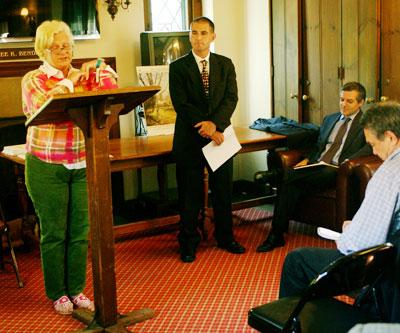Town Backpedals on Beach Concession Changes
Town Backpedals on Beach Concession Changes

All of the bids received from mobile food vendors hoping to become exclusive concessionaires at East Hampton Town beaches will be thrown out, and a plan to award the right to sell at a particular beach to a single entity has been scrapped.
A storm of protest blew up on Thursday when Montauk residents got wind that the Ditch Witch, a food wagon run by Lili Adams at Ditch Plain beach for many years, was not the winning bidder for a concession at that site, which is adjacent to the East Deck Motel.
A "Save the Ditch Witch" Facebook page quickly drew over 1,000 followers by mid-afternoon Thursday and town board members were inundated with hundreds of e-mails calling the Ditch Witch an institution and questioning how a local business owner could be shut out. Plans were laid for a rally at Ditch beach -- with drumming -- and suggestions made of not only boycotting a new food truck there, but forming a human chain to prevent anyone other than Ms. Adams from getting in.
In a hastily called special meeting early Thursday afternoon, the town board met to discuss the request-for-proposals process it had used to select the food truck vendors who would have been allowed to sell at the beaches.
Based on complaints in previous years from vendors and the public about crowding and potential turf wars from an increasing number of food-truck vendors, the board, with Councilwoman Julia Prince spearheading the effort, had sought a way to control the situation at popular beaches.
Based on a scoring system that weighed criteria such as experience, qualifications, and financial capability with subcategories counting for 30 percent of the score, a business and marketing plan, (30 percent), and proposed financial terms -- seasonal rent to be paid to the town -- counting for 40 percent of the score, winning bidders were selected and expected to be approved with a vote of the town board at a meeting Thursday evening.
The Ditch Witch, and another longtime vendor, Beach Dog, the Bogetti family's food truck, were not selected. Instead, the rights to sell at Otis Road in Montauk, a site at the Ditch Plain beach where Ms. Adams normally set up, were to be given to a newcomer, Turf Lobster Rolls, and the vendor for Ditch Plain main parking lot to the west would have been Montaco, which came on the scene last summer. A Facebook page was also set up for Beach Dog, and support for the Bogettis also began to swell.
The Paddy Wagon, another longtime Montauk vendor that uses the parking lot at the end of West Lake Drive, won that bid, and Dune Doggie, the longtime vendor at Indian Wells Beach in Amagansett, won the right to stay at that spot. No bids were received for other town beaches.
The proposals were all scored, according to the evaluation criteria, by a committee of four people appointed by the board, which then provided information to the board about the scores and made recommendations on the bidders.
Town Supervisor Bill Wilkinson said that, "because of the number of inquiries we were getting," board members had stepped in and reviewed the original proposals for the Otis Road concession on Thursday morning.
One thing, he said, "jumped off the page at us." The Turf Lobster Rolls vendor, he said, "had a very limited menu that started at $17 for a lobster roll."
"Suitability of proposed food items to meet the needs of beachgoers" is one of the scoring criteria. The board also found a "minor tabulation error" in the point scoring, Councilman Dominick Stanzione said, which brought the difference in scores between Ms. Adams's Ditch Witch and Turf Lobster Rolls to just two points.
Town Councilwoman Theresa Quigley said that she had reviewed the proposals submitted and realized that bidders had not been given a detailed breakdown of the points to be assigned to the individual criteria in each subcategory. "I think that renders the bids invalid," she said.
John Jilnicki, the town attorney, agreed. "It's really not fair to any of the bidders."
In addition, Ms. Quigley said, on the list of criteria given to the scoring committee, the words "understanding of customer base and community" were underlined, indicating, perhaps that that criteria should be given extra weight. The information provided to vendors did not highlight that phrase, she said.
Although, legally, non-local vendors could not be excluded, the intent, Mr. Wilkinson said at the meeting, was to "customize this in such a way" as to give longtime local vendors an advantage.
Therefore, items such as experience and an understanding of the community were weighted more heavily than other criteria, and, overall, the proposed rent to be paid would account for only 40 percent of the score.
The board intends to fine tune the exclusive concessionaire process with an eye toward later implementation, but, with Memorial Day fast approaching, it will return to the previous rules on peddling, as had been on the town code before the recent change. Enforcement of the rules will be stepped up.
Any licensed food truck will be able to park, on a first-come, first-served basis, in designated spots only at town beaches. A provision of the law outlawing overnight parking at those spots, often overlooked in past years, will also be enforced.

